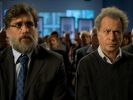Eye For Film >> Movies >> Footnote (2011) Film Review
Joseph Cedar's previous feature Beaufort used the true story of an Israel Defence Forces-occupied fortress in Lebanon to allegorise the bunker mentality of the beleaguered Israeli state and this follow-up both expands and domesticates that film's themes. As in Beaufort, a fortress will play a pivotal role in the plot – and even if this time round the fortress is merely metaphorical, it proves as capable as any concrete structure of entrapping and destroying its blinkered occupants. As, however, might be expected in a film entitled Footnote and set within an academic milieu, Cedar's weapons of choice are not shells nor roadside bombs but words – including one particular word which will come to be subjected to close philological scrutiny, exploding all the protagonist's illusions about himself, his family and his legacy.
Described by his daughter-in-law as 'autistic', elderly Professor Eliezer Schkolnik (Schlomo Bar Abe) has devoted his life to words, to the exclusion of everything and everyone else. A joyless man of near obsessive-compulsive routine, this grumpy Talmudic scholar spends his days buried in the basement of his university's library and his evenings locked away in his study at home, wearing earmuffs to block out any noise that might intrude upon his research and sleeping on the study's sofa bed rather than beside his long-suffering wife Yehudit (Aliza Rosen).

Eliezer had invested 30 whole years of his youth into meticulously piecing together a lost medieval version of the Talmud, only for his academic colleague and rival Professor Yehuda Grossman (Micah Lewensohn) to discover a copy of the actual lost text just one month before Eliezer was due to publish his monumental reconstruction. His work both validated and rendered utterly irrelevant in one fell swoop, Eliezer has for decades since been sidelined and ostracised within the academic community.
His only measurable achievement is that he was long ago acknowledged by name in a footnote of his late mentor's great scholarly tome on Talmudic studies – and he remains a footnote on today's campus too, with few writings to his name, an outmoded approach to scholarship, research too abstruse for his 'idiot' colleagues to understand, and with a lecture course attended by just one student. The only thing still sustaining him is an unyielding, though perhaps not well founded, sense of superiority.
Yet even as Eliezer has been passed over for 20 successive years by the board (headed by Grossman) that awards the coveted Israel Prize, Eliezer's middle-aged son Professor Uriel Schkolnik (Lior Ashkenazi), who has followed his father into Talmudic studies and works in the same department, has received one plaudit after another for his more populist work, and so become the convenient focus of all Eliezer's deep-seated resentments.
Then one morning (dubbed "The Happiest Day In The Life Of Professor Schkolnik" in one of several arch intertitles), Eliezer gets an unexpected phone call from the Ministry of Education informing him that this year's Prize is his - and so he hubristically sets out on a path of cold-hearted revenge that will turn out to be both tragically misguided and irreparably damaging.
Cedar's film may boast a playfully melodramatic string score (by Amit Poznansky), occasional scenes of low-key farce, and some keen satire of Academia's institutionalised pettiness (not to mention Israel's officious application of security measures), but the initially breezy tone of the comedy gives way to a depiction of calculated cruelty monstrously vicious enough almost to qualify as horror, human enough to count as tragedy and nuanced enough to face viewers with a most unusual kind of dilemma, part intellectual and part moral.
Trapped in the very 'fortress of culture' that he has constructed around himself and his family, Eliezer must eventually resort to his much-vaunted philological skills to analyse and uncover the errors, deceits and self-immolations that he has, in his egotistical blindness, helped promote, and so is confronted with the vanity for which he is at last being (wrongly) celebrated. His empty triumph is also his son's ruin, creating a tradition of indignation, recrimination and bitterness that will no doubt be passed on down to Uriel's own feckless son Josh.
Footnote ends as it begins, with Yaron Scharf's camera remaining rooted on Elezier's facial expression which, though fixed, is all too readable for those with the right interpretative tools. The film, too, offers an unflinching portrait of a deeply unlikable man, while suggesting that, as much as he – and no doubt we – might like to deny it, Eliezer is, in all his vindictiveness, his narcissism, his inflated sense of entitlement, and his capacity for delusion, quite a bit like the rest of us (and certainly like his son).
That his final charade will unfold not just in the presence of his family and colleagues, but also in the presence of members of the Knesset (including the Prime Minister), makes Cedar's drama of infidelity and falsehood extend beyond the confines of the domestic sphere to the realm of national politics. As for what such accusatory allegory might suggest about the state of Israel, Cedar trusts his viewers to observe the fine print and read between the lines.
Subtly drawn and perfectly performed, Footnote was a deserved winner of the 2011 screenplay award at Cannes, as well as taking awards across the board from the Israeli Film Academy. And while the very substance of the film's plot might lead you to question the validity of such awards and ceremonial recognition, Footnote really is a refreshing original, expanding its apparently small-scale, pedantic concerns into an examination of truth itself, and of the aggression and violence which we will commit to defend our place within truth's walled façade.
Reviewed on: 23 Oct 2011

















